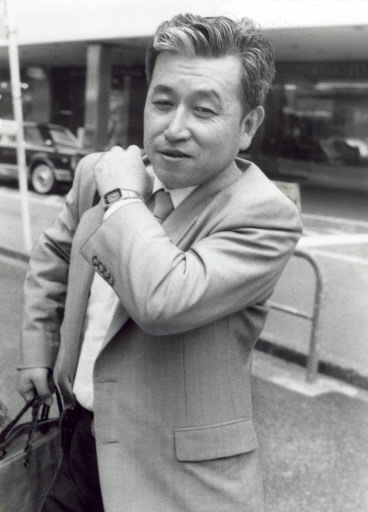The "Moral Adoption" of Hiroshima’s A-bomb Orphans, Part II [3]
Feb. 1, 2009
Warm support from moral mother and sister includes inheritance
by Akira Tashiro and Masami Nishimoto, Special Reporters
This series of articles continues the story of the "moral adoption" of children in Hiroshima by American citizens. It was originally published in July 1988. The exact spelling of some names could not be confirmed.
We met with Eiji Mitani, 53, a Tokyo resident, at a hotel there. He had just finished working a 24-hour shift. As the leader of a team of security guards dispatched from a security company, he patrols buildings like hotels and department stores, supervising and giving guidance to the security guards. His uniform, from which he had just changed, was neatly folded and packed in a bag in his hand.
"Is this about Ms. Peters?" he asked and closed his eyes for a moment, as if bringing her image back to mind. He then slowly began to talk about her.
In the spring of 1950, when he was a second-year student in junior high school, Sally Peters, a widow, became Mr. Mitani's "moral parent" after he lost his own parents due to the atomic bombing. The arrival of a striped polo shirt at the Hiroshima War Orphans Foster Home opened their communication. She was living in Laguna Beach, California, where she served as the head of a branch office of the World Federalist Movement. "Ms. Peters was a warm, gentle person," said Mr. Mitani.
"Eiji, you have to go to high school and university," Ms. Peters told him when she came all the way to Hiroshima to see him in 1953. At the time, Mr. Mitani had already graduated from junior high school and was living with a tailor in Hiroshima and serving as his apprentice. "I want to stand on my own two feet as soon as possible, rather than go to school all those years," he responded. His moral mother gave in to his wishes.
In the following year, 1954, Mr. Mitani moved to Tokyo. With financial support from his moral mother, he studied cutting and designing at a dressmaking school in Tokyo, while attending an English conversation school in his spare time. Secretly dreaming of becoming a designer in the United States, he received a letter from Ms. Peters which mentioned a second visit to Japan. "I want to see how hard you're studying," she told him. But another letter quickly arrived to inform him of her sudden death.
It was the first letter I translated with a dictionary in my hand," he explained. "I was so shocked." Her death occurred in May, during his second year in Tokyo, but his moral mother's influence in his life continued uninterrupted. A letter arrived from Ms. Peters' daughter, Nancy, telling him that she had left an inheritance for him for his future. Nancy, 15 years older than Mr. Mitani, encouraged him as a "moral sister."
Before long, the inheritance of 500 dollars from his moral mother, or 180,000 yen at the time, was transferred to him. With a monthly salary of 3,000 yen back then, earned at a tailor's shop in Tokyo, the bequest was an unimaginably large amount of money for Mr. Mitani.
In 1964, the year the Olympic Games were held in Tokyo, he became independent and, by using part of his inheritance, opened a shop in his own apartment with the sign "Tailor Mitani." In this way, he reached the goal he had set with the support of his moral mother and sister. In the same year, Nancy took her husband, William Wolf, a professor at the University of Southern California, and her three children to Japan to see Mr. Mitani.
However, three years after her visit to Japan, his moral sister died of illness. At that point, Mr. Mitani believed his connection with his moral family would be severed with her passing. Then, Professor Wolf wrote and told him, "You're a member of our family." This letter began the communication between the two men as "moral brothers." A number of Professor Wolf's students have visited Japan and the professor has introduced them to "Tailor Mitani." Nancy's older sister, Betty, and her husband came to Japan three years ago and met Mr. Mitani.
Among the A-bomb orphans of Hiroshima who received both material and psychological support from moral parents, Mr. Mitani's case is outstanding. "I was blessed," he says. Each member of the Peters family received Ms. Peters' "feelings toward her child in Hiroshima" as a spiritual legacy.
Mr. Mitani quit working as a tailor six years ago and took up his current work at the security company. "Even if I go out to take orders for men's suits, there's only so much I can do by myself," he explained. Perhaps feeling some regret at not having fully carried out "his mother's legacy," his words slowed. Glancing at the headlines of old newspaper articles that featured his story as a young man--"Mother's love expressed in her will" and "Aspiring to be the finest tailor"--Mr. Mitani murmured: "My moral family has certainly given me great support over the years." His comment was nearly lost amid the bustle of our surroundings.
(Originally published on July 26, 1988)








